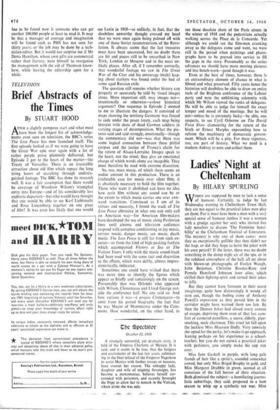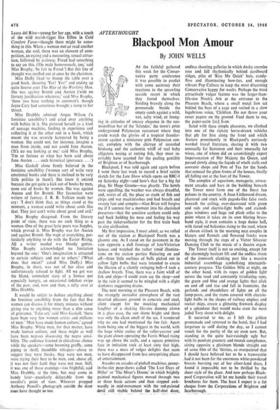Ladies' Night at Cheltenham
By HILARY SPURLING
WomEN are supposed by men to lack a sense of humour. Certainly, to judge by last Wednesday evening in Cheltenham Town Hall, they are not equal to the practical jokes men play on them. For it must have been a man with a very special sense of humour (unless it was a woman with a grudge against her sex), who invited five lady novelists to discuss 'The Feminine Sensi- bility' at the Cheltenham Festival of Literature. The mystery is why any of them came : were they so exceptionally gullible that they didn't see the trap, or did they hope to hoist the joker with his own petard? If the latter, there was no doubt something in the damp night air of the spa, or in the subdued atmosphere of the hall, all set about with blown-up photographs of Evelyn Waugh, John Betjeman, Christine Brooke-Rose and Pamela Hansford Johnson inter ethos, which chilled their fighting-spirit and turned their jokes to jelly.
But they cannot have foreseen in their worst imaginings quite how distressingly it would all turn out, though the boding irony of Anthony Powell's expression as they passed him in the corridor might have warned them too late. By then the Demon Joker had closed every avenue of escape, depriving them even of that last com- fort of cornered panellists, a suave, elderly, pipe- smoking, male chairman. This cruel lot fell upon the luckless Miss Maureen Duffy. Very unwisely she opted for the perky, let's-make-it-go approach, leaning perhaps on her experience as a school- teacher; but you do not outwit a practical joker with perkiness, you simply make his cup run over.
Miss Jane Gaskell in purple, with long pale fronds of hair like a sprite's, sounded somewhat cowed, but only Miss Brigid Brophy in gold, and Miss Margaret Drabble in green, seemed at all conscious of the full horror of their situation. Both dismissed the subject—a humiliating journa- listic subterfuge, they said, proposed in. a lean season to whip up a synthetic sex war. Miss Laura del Rivo—young for her age, with a touch of the wild marsh-tigget like Elf= in Cold Comfort Farm—thought there might be some- thing in this. When a woman met or read another woman, she said, there was an element of com- petition, an eyeing and a measuring, sexual attrac- tion, followed by jealousy. Freud had something to say on this. ('On male homosexuals, too,' said Miss Brophy, 'be fair to Freud.') But this line of thought was snuffed out at once by the chairman.
Miss Duffy liked to thump the table over a good book, shouting 'Yes! Yes!' and ending up quite hoarse over The Rise of the Working Man. She was against Brontë and Austen (`with no literary justification whatever,' said Miss Brophy, 'these two have nothing in common'), though Joyce Cary had sometimes brought a lump to her throat.
Miss Drabble admired Angus Wilson ('a feminine sensibility') and cried over anything with babies in it. She pictured herself as a kind of sausage machine, feeding in experience and collecting it at the other end in a book, which meant she was severely hampered by being a woman. She could not, for instance, imagine a man from inside, and nor could Jane Austen. (It's no use looking at me,' said Miss Brophy, 'I'm so furious at what has been said about Jane Austen . . . such historical ignorance. . . .')
Miss Gaskell alone firmly believed in the feminine sensibility ('women sort of write very emotional books and there is inclined to be very little politics in them'). She knew it existed because she got quite a kick out of books by men, none out of books by women. She was against Austen and for Brontë. Her favourites were writers of fantasy. J. R. R. Tolkien made her cry: 'I don't think that, as things stand at the moment, a woman could write about souls like that. They just can't write about good and evil.'
Miss Brophy disagreed. From the literary point of view, there was no such thing as a woman. One of the great lyric poets was Sappho, which proved it. Miss Brophy was for Austen and against Brontë. She wept at everything, par- ticularly anything to do with the Easter Rising. All a writer needed was bloody genius. Miss Brophy acknowledged no limitation beyond the one: 'One's imagination is attracted to certain subjects and not to others.' (What does that mean?' asked Miss Duffy.) Miss Brophy, in short, was out of her class and unfortunately refused to fight. All we got was the bland, somnolent stare of a lioness not especially hungry, an occasional indolent swipe of the paw, and, now and then, a nifty swat at Miss Drabble.
It would be unfair to deduce anything about the feminine sensibility from the fact that five women can discuss it for ninety minutes without giving rise to anything more than a dim sense of grievance. 'Take art,' said Miss Gaskell, 'there have been very few women artists and millions of men.' Men have made human culture,' agreed Miss Brophy. White men, for that matter, have made human culture, and these might as well have been negroes discussing the negro sensi- bility. The audience listened in chivalrous silence while the speakers—some booming gruffly, some piping in shrill, inaudible whispers—chose to suggest they were freaks, they were not men, were trying their best to be men, and, above all, it was not their fault they were not men. Still, it was one of those evenings—too frightful, said Miss Drabble, at the time, but may come in handy later—peculiarly delectable from the novelist's point of view. Whoever propped Anthony Powell's photograph outside the door must have thought so too.







































 Previous page
Previous page